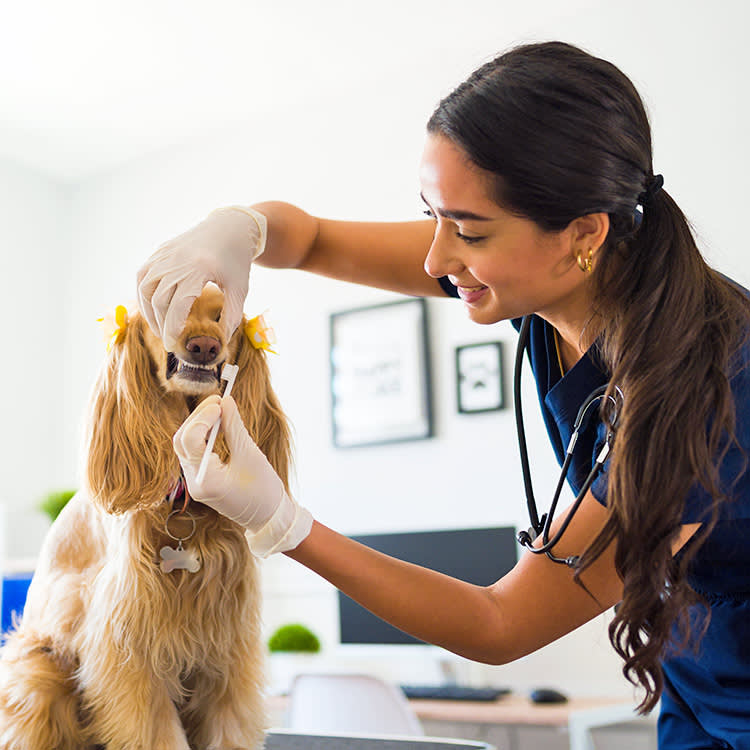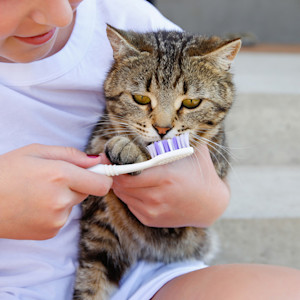Does Pet Insurance Cover Dental Cleanings and Treatments?
Don’t worry—we’re here to help you decode your confusing policy.
In This Article:
Understanding Pet Insurance Does Pet Insurance Cover Dental Treatments? Types of Dental Coverage Cost and Value of Dental Coverage Alternatives to Pet Insurance for Dental Care
Have you ever been surprised by a big vet bill? That’s particularly true when it comes to dental care.
Dental care is one of the most overlooked, expensive aspects of a pet’s healthcare. As with people, dogs and cats need regular dental cleanings to keep their teeth and gums healthy. Without routine care, plaque can build up, and that may lead to periodontal disease — one of the most common medical issues in pets.
It’s natural to wonder: Does pet insurance cover dental cleanings and treatments? The answer depends on your policy and your provider. Some pet insurance plans help with dental illnesses and injuries, but few cover routine cleanings unless you have a specific wellness add-on.
Let’s explore how pet insurance handles dental coverage, why it matters, what kinds of care might be included, and how to make sure your pet’s teeth stay healthy without breaking the bank.
How much do you spend on your pet per year?
Understanding pet insurance
Why don’t many pet health insurance plans cover dental care? At its core, pet insurance is designed to protect you from unexpected veterinary expenses related to accidents and illnesses, not routine maintenance.
When you take your pet to the vet for an emergency, insurance may reimburse some of the cost. However, regular care (such as dental cleanings) typically falls outside standard coverage. If you’re new to pet insurance, check out our guide for a detailed breakdown of what’s usually included and what’s not.
Types of pet insurance
Pet insurance usually comes in three forms, and each offers different levels of coverage.
Accident-only plans
These policies cover injuries caused by accidents, like a fractured tooth from a fall or a mouth injury from chewing something hard. However, they don’t include illnesses or routine dental care.
Accident and illness plans
The most common and comprehensive option, these plans cover both injuries and diseases. Depending on the insurer, they may reimburse for dental illnesses like abscesses, infections, or periodontal disease if the condition isn’t preexisting.
Wellness or preventive care plans
These plans, often available as add-ons, cover expected, routine expenses, such as vaccines and dental cleanings. Wellness plans don’t usually cover treatments for disease, but can help with the cost of regular maintenance.
Common coverage components
Although the specifics vary between pet insurance companies, most plans include:
Exams and diagnostics (X-rays, bloodwork, or imaging) related to covered conditions
Emergency procedures, including extractions due to trauma
Illness treatments, including dental diseases in some cases
Prescription medications and follow-up visits
However, most insurers make a clear distinction between dental illnesses (which might be covered) and dental maintenance (which usually isn’t).
Does pet insurance cover dental treatments?
The short answer: sometimes. You’ll need to dive into your insurance policy for clarity.
Whether or not your pet insurance covers dental treatments depends on the policy’s fine print. In general, insurers divide coverage into two categories: preventive care (like cleanings) and treatment for accidents or illnesses (like extractions or infections).
General coverage guidelines
Most pet insurance policies exclude routine or cosmetic dental services. However, they’ll often cover dental procedures that are medically necessary because of an injury or illness.
For example, your plan might help pay for:
A tooth extraction after an accident
Treatment for a mouth infection
Surgery to repair a jaw fracture
Medication to treat oral pain or swelling
Some insurers even include dental disease coverage if you maintain your pet’s preventive care according to veterinary recommendations.
Here’s what this may look like:
Lemonade Pet Insuranceopens in new tab covers dental illnesses as long as the condition isn’t preexisting.
Nationwide reimburses for dental disease under its Whole Pet plan, but not for cleanings.
ASPCA Pet Health Insurance includes dental accident coverage but limits illness coverage to certain conditions.
Always check the dental section of your insurance policy. Can’t find it? It’s often buried in the exclusions or special conditions section.
Factors influencing coverage
A few key things may determine if your insurer will pay for dental treatment.
Type of plan
Only comprehensive accident-and-illness plans or wellness add-ons usually include dental coverage.
Condition classification
Dental accidents (like broken teeth) are almost always covered, while dental illnesses (such as gingivitis) depend on your insurer’s terms.
Preexisting conditions
If your pet already has periodontal disease or dental decay before coverage starts, the insurer won’t reimburse related expenses.
Preventive care requirements
Some pet insurance companies require proof that your pet receives regular dental cleanings to qualify for illness coverage.
Annual caps
Many plans limit dental reimbursements to a certain dollar amount or percentage of your total coverage.
Types of dental coverage
Dental care isn’t one-size-fits-all. Insurers usually split it into preventive care and dental treatments, each with its own coverage rules.
Preventive dental care
Preventive dental care refers to regular dental cleanings and checkups that keep your pet’s mouth healthy and help prevent serious dental diseases later on.
During a dental cleaning, your vet removes plaque and tartar buildup, examines your pet’s teeth under anesthesia, and may take X-rays to check for hidden issues. This is the gold standard for maintaining oral health, but it’s also expensive.
If you explore our guide to dog teeth-cleaning costs, you’ll find that professional dental cleanings typically cost:
$300 to $700 for dogs
$200 to $600 for cats
That’s why many pet parents look for coverage options to offset the cost.
Standard pet insurance plans don’t cover preventive care like this, but you can often purchase a wellness plan add-on. These plans may reimburse a fixed amount each year (for example, up to $150 to $200) toward dental cleanings.
Although it may not cover the full cost, this helps reduce the financial burden and encourages regular vet visits. And that’s something that can prevent painful dental illnesses later.
Dental treatments and procedures
Dental treatments go beyond cleanings. They help you deal with actual dental diseases or injuries. These might include:
Tooth extractions
Root canals
Treatment for abscesses or infections
Oral surgery for fractures or tumors
Pain management or antibiotics
Most comprehensive pet insurance plans cover dental treatments if they’re medically necessary.
For instance, if your dog fractures a tooth while playing fetch or your cat develops an abscess, your insurer will probably reimburse the related costs. However, routine extractions performed during a cleaning may not qualify.
Cost and value of dental coverage
Dental care costs can vary dramatically, depending on your pet’s needs and where you live.
Routine cleanings range from $300 to $700, although anesthesia and X-rays can increase that.
Extractions or advanced treatments can cost anywhere from $500 to more than $2,000, especially for multiple teeth or complex oral surgeries.
Given these numbers, dental coverage is probably a worthwhile investment. That’s especially true for breeds prone to dental issues, such as toy dogs or cats with short snouts.
However, it’s important to weigh the monthly premium for wellness or comprehensive coverage against the likelihood of needing major dental work. If your pet is young and healthy, paying out of pocket for annual cleanings might be more cost-effective. But if your pet is older or has a history of dental disease, dental coverage could save you a lot of money over time.
If you’re comparing options, our pet insurance comparison guide can help you evaluate different providers and their dental coverage levels.
Alternatives to pet insurance for dental care
If your pet insurance doesn’t include dental coverage, or if the costs still feel out of reach, there are other ways to keep your pet’s mouth healthy without overspending.
Wellness plans
Standalone wellness plans or packages that you get through your vet can include annual dental cleanings and exams as part of a subscription or bundled preventive care plan.
Low-cost dental clinics
Some veterinary schools and nonprofit organizations have low-cost dental clinics that offer basic cleanings and extractions for a fraction of the usual price.
Preventive home care
The best way to reduce dental expenses is daily care at home. Brushing your pet’s teeth and giving them dental chews can prevent serious issues. Regular dental visits with your vet can delay or even avoid the need for costly procedures later.
Veterinary discount programs
Some vets participate in membership-based programs that offer discounted rates on services (including dental work) in exchange for an annual fee.
Payment plans and pet health credit
If your pet suddenly needs a dental procedure, many vet clinics offer payment plans or accept financing options like CareCredit.
Bottom line
Dental care is important for your pet’s long-term health, and ignoring it can lead to painful (and expensive) problems.
While most pet insurance plans don’t cover routine dental cleanings, they often include coverage for dental accidents and sometimes dental illnesses under comprehensive plans. If you need help covering preventive cleanings, look for a wellness plan or an add-on that includes dental benefits. And if your insurance doesn’t offer enough support, there are other ways to keep your pet’s teeth in shape.
Ultimately, maintaining your pet’s dental health is an investment in their happiness and longevity (and spending a little now may save you a lot down the road). The right combination of insurance and preventive care can protect both your pet and your wallet.
References
“Does Pet Insurance Cover Dental?” Progressive, www.progressive.com/answers/does-pet-insurance-cover-dentalopens in new tab.
“Does Pet Insurance Cover Dental Cleaning?” GoodRx, www.goodrx.com/pet-health/pets/does-pet-insurance-cover-dentalopens in new tab.
“Pet Dental Care Coverage.” ASPCA Pet Health Insurance, www.aspcapetinsurance.com/research-and-compare/pet-insurance-basics/pet-insurance-for-dental-careopens in new tab.










